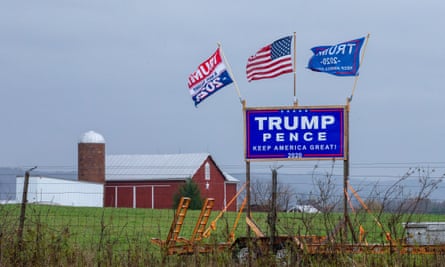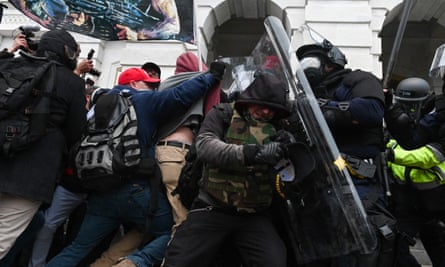In his inaugural address in January, Joe Biden promised to use his presidency to “restore the soul of America”. He would unite the nation, defuse “anger, resentment and hatred”, and lead Americans back to a world where they treated “each other with dignity and respect”.
Six months later, Biden is still preaching the unity gospel, and regularly assures his fellow Americans that “there’s not a single thing we aren’t able to do when we do it together”.
Drive 1,400 miles west from the White House, to Dallas in Texas where Brianna Brown lives, and there’s little evidence of politicians working together that she can see. As an African American fourth-generation Texan, Brown has been assailed since Biden came into office by a whirlwind of regressive laws emanating from the Republican-controlled state legislature.
The explosion of extreme rightwing legislation rammed through by Texas Republicans this session – culminating on Monday with the dramatic flight of Democratic lawmakers from the state in an attempt to prevent the passage of the latest voter suppression law – has left Brown feeling apprehensive and insecure.
She thinks about her own family’s long struggle for voting rights now threatened once again, is fearful about being accosted in the street by armed men legally bearing arms without a permit, bothered about what might happen to her when she next joins a peaceful protest, and worried about the fallout of a renewed push to build a wall along the Mexican border.
Top of her list of concerns is the Republican bill to make it even more difficult to vote – in a state that already makes it harder to vote than any other in the nation. Brown recalls how she once heard her grandmother having to remind herself that her vote was no longer conditional on the poll tax – a ruse once commonly used in the south to disenfranchise Black people.
“That was my grandmother!” Brown said. “To say that people fought and died for our right to vote – that’s personal for me.”
Brown is spooked about another new law set to come into effect in September that effectively tries to turn ordinary citizens into anti-abortion bounty hunters. It offers a $10,000 reward to anyone who successfully sues a fellow Texan for helping a woman seek an abortion beyond six weeks of pregnancy.
“It is chilling that this is happening,” she said.

As co-executive director of the Texas Organizing Project that seeks to empower Black and Latino neighborhoods, she is concerned too for the transgender men, women and children who are bearing the brunt of Republican intolerance in a state in which more anti-LGBTQ+ bills have been promoted by Republicans this session than in any other. “This is an assault on people who are on the margins,” she said.
And there’s more. Much more. There’s the order by the Republican governor, Greg Abbott, to all state agencies to block Biden’s efforts to combat climate change; the new law that punishes any Texas city that has the audacity to cut police budgets; the $1,000 fines that will be imposed on anyone requiring Covid masks to be worn in public schools; the gun law that allows Texans to carry handguns with no training and without a permit.
Brianna Brown is not feeling Biden’s vision of Americans doing things together. She is feeling the wrath of a Texan Republican party that since Donald Trump’s defeat in the presidential election last November has taken its animus to a whole other level.
“When I leave the house with my two-year-old daughter, I now carry with me two phones: a work phone, and a personal phone,” she told the Guardian. “I make sure I always carry both because I never know when I might need to call for help. The Republicans have incited their base. There are a lot of white people out there who feel very emboldened. Walking around as a Black person, the feeling is that this can easily escalate.”
Nor is Brianna Brown alone.
Across a vast swath of the American heartlands, the anti-Biden backlash is being replicated in Republican-controlled statehouses in what Ronald Brownstein has described in the Atlantic as a “collective cry of defiance”.
In some instances, the challenge to Biden is explicit. At least nine Republican-controlled states, Texas included, have passed laws banning the enforcement of federal firearms statutes in a blatant attempt to frustrate the president’s ambition to tackle the nationwide scourge of gun violence.
Twenty-six states have put a stop to the extra $300 a week in unemployment support that the federal government has extended through the pandemic, suggesting that they care more about resisting Biden’s economic agenda than about giving a helping hand to their own. The latest to do so, Louisiana, has the worst poverty rate in the US bar Mississippi – with one in five of its citizens below the poverty line.
In other cases, Republican-dominated legislatures have invested in hot-button social issues, aggressively targeting minority communities and other groups for attack. At least 15 states have between them enacted 90 measures to restrict access to abortions – a record number. Thirty-three states have pumped out 250 anti-LGBTQ+ bills, and five have allowed firearms to be carried without a license in a major loosening of gun laws.
The backlash so far this year has also involved virulent rightwing efforts to suppress the vote of Democratic-leaning demographics, especially people of color. In the first six months of the year, about 17 states have enacted 28 new laws that will restrict access to the ballot box, according to the Brennan Center, and more are certain to follow.
The welter of voter suppression measures is not only striking in its own right, it is indicative of one of the great driving forces of this year’s seismic eruption of toxic rightwing legislation. American politics is no stranger to Republicans responding fiercely to Democrats gaining control of Congress and the presidency – Newt Gingrich turned partisan obstructionism into an art form when Bill Clinton was in the White House, while Barack Obama’s victory as the first Black president gave rise to the Tea Party.

But the accent in 2021 on tampering with and tamping down the vote is a sharp departure from past form, both in its ferocity and in its extremism. The new trend is evident not just in attempts by states like Texas to erect additional hurdles to voting that especially affect African American and Latino communities.
Most sinisterly, bills have been introduced that would grant state lawmakers the power to overturn the legitimate will of the people in a contested presidential election. They would empower themselves to substitute their own winner – the electoral equivalent of a coup.
For Jacob Hacker, a political scientist at Yale, the attack on elections and the very machinery of democracy sets the current Republican fury apart. “This is different. Republicans at state level have moved from pursuing conservative economic policies to pushing measures designed to cripple the opposition and undermine democracy.”
Hacker added: “The Republican party used to be anti-Democratic, now it’s anti-democratic.”
The rocket fuel propelling the emergence of a fundamentally anti-democratic strain in Republican politics is Trump and his big lie that the election was stolen from him. The defeated president continues to peddle the falsehood, inciting his supporters with the potent belief that the current occupant of the White House is an impostor.
“Trump has broken a fundamental norm that politicians don’t refuse to accept the legitimacy of a free and fair election, and that has been hugely empowering,” Hacker said. “He has turned it into a loyalty test – are you with or against us? Either you believe, or pretend to believe, that Trump won the election, or you will be destroyed.”
In his new book with Paul Pierson, Let Them Eat Tweets, Hacker describes what he calls the “doom-loop” of rising outrage that now has the Republican party in its grip. Politicians stoke anger by assaulting a plethora of targets – Black people, immigrants, transgender youth, women seeking abortions, BLM protesters, critical race theory – to fire up the base.
Voters in turn get riled up, baying for the blood of anyone who crosses Trump or steps out of line. Party leaders duly respond by stoking up more outrage – and so the “doom-loop” turns and intensifies.
This tendency is quite consciously embraced by the party leadership. The New York Times unearthed a memo from Jim Banks, a Congress member from Indiana and chairman of the Republican Study Committee, in which he regurgitated frenzied exaggerations about critical race theory and concluded: “We are in a culture war. My encouragement to you is lean into it. Lean into the culture war.”
Such clear signs of a coordinated national resistance should not obscure the fact that today’s torrent of Republican anger has been a long while in the baking. Vote View, an academic research project, has tracked party ideology over time and found that while the Democratic party has moved gradually to a more overtly liberal stance, the shift by Republicans has been much more dramatic.
Since the 1970s the party has moved sharply to the right, increasingly aligning itself with white voters resentful of the civil rights movement, evangelical Christians and the cultural issues now so beloved of the leadership. Long before Trump burst on the scene, Vote View was recording that the Republican party was projecting its most conservative ideology in a century.

You can’t understand such a rush to the right without considering demographic changes that have radically altered the face of American society over the same modern period. Ryan Enos, a social scientist at Harvard, has carried out groundbreaking research that shows that voters are now more segregated according to their partisan loyalties than they are by racial group.
“We think of America as a very racially segregated society. But we were surprised to find that Democrats are even more likely to live around Democrats, and Republicans with Republicans – and that drills down even to the level of neighborhoods.”
The physical segregation of voters has been matched by hardening political identities. Lilliana Mason, a political scientist at Johns Hopkins, has studied the self-identity of the American voter, discovering that over the past four decades it has become ever more tied to party allegiance.
“Partisanship has become a social identity, meaning that our sense of ourselves, who we are in the world, and even our sense of status is linked to our party. That’s who I am, and my emotional state is connected to whether my party is winning or losing,” she told the Guardian.
Mason’s research has found that between 1972 and 2016, not only have the two main parties moved sharply apart in conservative and liberal directions, but their supporters have also separated out in terms of race.
“Whites are moving very far towards the Republican party, and Blacks are moving very far towards the Democratic party. That divide increased by about three times over those years,” she said.
Throw partisan ideology and racial resentment into a pot, and the result is a fevered political climate in which elections are increasingly seen as existentially important. “We are clearly having a battle over social hierarchy and white patriarchy,” Mason said.

In her upcoming book with Nathan Kalmoe, Radical American Partisanship, Mason reaches some alarming conclusions based on a series of surveys conducted over several years. Since 2017, the proportion of voters who think that physical violence against the opposite party could be at least a “little bit” justified has increased markedly.
The trend is especially stark for Republicans. When asked whether violence was justified were the Democrats to win the presidential races in 2020 or 2024, the proportion of those who assented leapt from 20% shortly before last November’s election to almost 30% in February.
Throw the big lie into the pot, and the bubbling stew of anger and hatred begins to boil over. Just after Biden became president-elect, Mason held another survey of voters and was chastened by what she learned.
Republicans who subscribed to the calumny that the election was stolen were far more likely to endorse violence to advance their political goals. If that’s the view of a significant chunk of the American people, Biden has a job on his hands.
